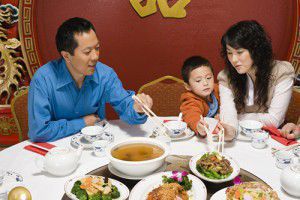Dinner starts with family
For most people, ‘Chinese food’ would represent the customary weekend or end-of-the-month takeaway, which could include chicken fried rice, spring rolls or even barbeque spare ribs. It is a fact – little known as it may be – that many Chinese families do not eat these dishes on a regular basis. Most of them are probably cooking meals like these daily and are sick of it! 🙂
 Ever since I was young, my parents have stressed the importance of traditional Chinese cuisine, and as chefs, they know it’s all about the flavour. Dinner is the most important meal, as this is the time when all the family sits down to eat.
Ever since I was young, my parents have stressed the importance of traditional Chinese cuisine, and as chefs, they know it’s all about the flavour. Dinner is the most important meal, as this is the time when all the family sits down to eat.
The main ‘ingredient’ to a usual family dinner is steamed rice or ‘fān’– always white long grain rice, never wholemeal or pre-boiled, and it is always cooked in a rice cooker. Each person at the table has their own bowl of rice and they each pick some ‘sūng’ – dishes that are laid out in the middle, so everyone can have a bit of everything. ‘Sūng’ can be things such as steamed fish with ginger and spring onions, cured meats or mixed leafy green vegetables with oyster sauce. My father does most of the cooking so he sometimes creates his own dishes, such as stir-fried tofu with pork and sweetcorn or marinated chicken wings.
The number of dishes available varies to cater for however many people are at the table, and dinnertime is only over when all of the dishes are eaten – it is sometimes a tough job but it has to be done!
Since living in London, I have tried a number of different cuisines, such as Greek, Lebanese and Japanese, but nothing seems to fill in the gap of a family dinner. Regardless of whether it is Chinese New Year or even just to celebrate the fact that it’s Sunday, I have been unable to indulge in the comforts of a close-knit family dinner as often as I would like to and the idea of resorting to a takeaway, just to fill the void, seems like a somewhat empty substitute.
Has the family dinner gone out of fashion or to some people, is there no place like home?
Katie
To dub or not to dub?
As a British-born Chinese citizen, I adore old Hong-Kong martial arts films. By the time Jackie Chan had made his Hollywood debut, I had seen a number of his critically acclaimed films such as Project A, Wheels on Meals (set and filmed in Barcelona) and Armour of God (where he almost died after a stunt went wrong).
One particular film that stood out was City Hunter, where Jackie Chan plays a bumbling detective caught in the middle of a raid on a cruise ship. The film was quite special as it featured Eastern and Western martial artists with speaking parts – something that I had rarely seen at the time.
I first watched it with all the dialogue in English (even that of the Asian actors) when I was around 10 years old and found it hilarious, but I watched it again several years later only to find all the dialogue was in Chinese, and I didn’t find it so funny. There was a time in the 1980s when martial art films became almost ‘cultish’ with TV audiences, particularly in America. The reason? Whenever they were shown on TV – usually on a weekend when kids were home and could mimic the moves – you had a really bad dialogue (loosely translated from the original script) and terrible lip sync.
Animated films are fortunate enough to not be so heavily affected by dubbing, but when you compare a dubbed live-action with one in its original language, you have to wonder if dubbing is really necessary. Sure, the inclusion of English in any media will make it more accessible than leaving it in languages such as Arabic, Chinese or Spanish, but I would like the idea of all the characters speaking in their own language and providing subtitles where necessary. A colleague pointed out that Inglourious Basterds by Quentin Tarantino is an example of this and it is this feature that explains why it is one of my current-favourite films. All the characters speak their native language or speak the language relevant to the scene with subtitles appearing only when they’re needed.
Dubbing allows the audience to hear a piece of dialogue in a way that is culturally relevant to them and it’s often seen as an alternative to subtitling because the idea of reading during a film can put people off. But this also robs the film of something that’s significant to the nationality of the speaker, lessening the impact of any colloquial phrase.
Are you pro-dubbing or against it? Do you see the need to read subtitling?
Katie
There’s something different about this one…
I see myself as a moderately well-travelled person, having visited most of Europe, Hong Kong, Japan and the southern states in the USA. Many memories are made on each trip, whether they are about trying strange food, meeting friendly locals or even having the odd moment of hilarity – but one thing I always find is that confusion crops up about my ethnic appearance. I’m not even sure if it’s in a good or bad way.
I’m a British Born Chinese, speak English fluently and studied Spanish at university, so I am pretty comfortable with visiting most parts of the world. I don’t have any qualms about learning even more languages, if it helps me get by. But my appearance seems to evoke different…. responses.
 For instance, a short conversation while getting coffee at a gas-stop in New Mexico left a cashier confused when she said I (apparently) spoke like the Queen. Flip side to this: during a night out in Acuña, Mexico, a bartender was surprised to be able to talk to me in great detail about how film director Robert Rodriguez used his tavern to film a part of his feature Desperado, as I was the only one who could speak and understand Spanish – something that also helped make a complaint about a dirty and unmade hotel room in Las Vegas.
For instance, a short conversation while getting coffee at a gas-stop in New Mexico left a cashier confused when she said I (apparently) spoke like the Queen. Flip side to this: during a night out in Acuña, Mexico, a bartender was surprised to be able to talk to me in great detail about how film director Robert Rodriguez used his tavern to film a part of his feature Desperado, as I was the only one who could speak and understand Spanish – something that also helped make a complaint about a dirty and unmade hotel room in Las Vegas.
A weird occurrence was when a tourist wanted a picture taken with me during a visit with friends to the Carlsberg Museum in Copenhagen. The reason? He had never seen a Chinese person before.
Multiculturalism is growing everyday and so more people are becoming accustomed to different ways of life. But there are parts of the world that are not so used to ethnic diversity, and particularly given Asians’ distinctive appearance, seeing someone different walk through the door will always have that element of surprise. Even more so if that person can talk and understand you – that always raises a smile… or perhaps a furrowed brow.
Do you find yourself surprising people on your travels with your linguistic abilities? Or have you met someone who catches you unawares by conversing in your native tongue?
Katie
A Chinese Cultural Calamity
In June 2010, I began a six-month journey through Asia, and my first day saw me crashing into Chinese culture.
I arrived in the hutongs of Beijing (traditional closely grouped houses) where I was met with the foreign smell of uncovered meats being cooked on narrow streets, the noisy chatting of families sat on the brick steps of their homes and the overpowering forty degree heat and ninety percent humidity. It is needless to say China was a cultural shock but the exact one I was looking for.
My first venture onto Beijing’s streets was with a French roommate and we were in search of a real Chinese meal. As I wandered down the cobbled streets, only now slightly cooling as the sun set behind the skyscrapers of Beijing’s far away business district, we picked a restaurant that seemed to be thronged with locals and came with an almost essential picture menu. Having a weighty twenty hours of basic Mandarin lessons under my belt I was able to get a table for two, order a beer, and some water for the table. I felt newly alive as we sat chatting in the busy restaurant, watching locals devour their various feasts. The smell of the Mongolian lamb I had ordered, a specialty I had been told about before my trip, was enticing and the sight of it was even better. I remembered all I had learned about Chinese table manners and customs; that turning over a fish was bad luck, to always leave food at the end of your meal to avoid offending the generosity of your host and to never leave chopsticks stuck in the food as this symbolises death! After a twelve-hour flight I was ravenously hungry and as the food was laid upon the table I attempted to dive in. It was then I realised that there were only chopsticks on the table… an item I had somehow never really learned how to use… In a feeble attempt I tried to pincer pieces of succulent lamb and flick them toward my mouth. Alas this was in vain, and it was only after fifteen minutes, perhaps three mouthfuls of food and with the sound of my rumbling stomach distracting other diners, that the waitress quietly slid a fork on to my table with a beaming smile. This experience not only demonstrated the kindness shown towards me by the vast majority of locals that I would meet throughout China, but also showed me that as much as you can practise a language and learn about a culture, sometimes you just have to go somewhere to get a true idea of a country and its people. Needless to say the food disappeared in seconds and that Mongolian lamb is still perhaps the best tasting meal I have ever eaten!
If anyone else has had an experience as embarrassing, or has been touched by another culture, feel free to tell us about your experience wherever you have been in the world.
Glyn




